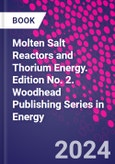Molten Salt Reactors and Thorium Energy, Second Edition is a fully updated comprehensive reference on the latest advances in MSR research and technology. Building on the successful first edition, Tom Dolan and the team of experts have fully updated the content to reflect the impressive advances from the last 5 years, ensuring this book continues to be the go-to reference on the topic. This new edition covers progress made in MSR design, details innovative experiments, and includes molten salt data, corrosion studies and deployment plans. The successful case studies section of the first edition have been removed, expanded, and fully updated, and are now published in a companion title called Global Case Studies on Molten Salt Reactors.
Readers will gain a deep understanding of the advantages and challenges of MSR development and thorium fuel use, as well as step-by-step guidance on the latest in MSR reactor design. Each chapter provides a clear introduction, covers technical issues and includes examples and conclusions, while promoting the sustainability benefits throughout.
Please Note: This is an On Demand product, delivery may take up to 11 working days after payment has been received.
Table of Contents
Applications
1. Introduction?
2. Electric Power Generation
3. Other Applications
Technical Issues
4. MSR Reactor physics: characterization, neutronic performance, multiphysics coupling, and reduced-order modeling
5. Kinetics, dynamics and neutron noise in stationary MSRs
6. Thermal hydraulics of liquid-fueled MSR
7. Materials
8. Physical-chemical properties of molten salts and Chemical technology of MSR fuel cycle
9. Environment, waste, and resources?
10. Nonproliferation and safeguards
Reactor Types
11. Liquid fuel, thermal neutron spectrum reactors
12. Fast-spectrum, liquid-fueled reactors?
13. Solid fuel, salt-cooled reactors
14. Static liquid fuel reactors
15. Accelerator-driven systems
16. Fusion_fission hybrids
Reactor Designs
17. Thorium molten salt reactor nuclear energy system (TMSR)?
18. Integral molten salt reactor
19. ThorCon reactor
20. Severe Accident Modeling and Safety Assessment for Fluid-fuel Energy Reactors (SAMOSAFER) 565
21. Stable salt fast reactor
22. EXODYS Molten Chloride Fast Reactor
23. Copenhagen Atomics waste burner
24. Seaborg Technologies ApS
Compact Molten Salt Reactor (CMSR) Power Barge
25. Dual-fluid reactor
26. Kairos Power Pebble Bed Reactor
27. TerraPower Fast Chloride Reactor
28. Conclusions
Authors
Thomas James Dolan Adjunct Professor, Nuclear, Plasma, and Radiological Engineering Department, University of Illinois, USA. Professor Dolan has worked on nuclear technology and international relations issues for three universities, five national laboratories and in nine countries, including in his position as Physics Section Head for the International Atomic Energy Agency in Vienna. Dolan's primary research interests are concerned with molten salt fission reactors and nuclear fusion technology.He developed three courses at the University of Missouri-Rolla on fusion research principles, fusion experiments, and fusion technology. As well as the numerous academic positions he has held, he also has experience working in industry (Phillips Petroleum Company) on fusion research and other nuclear topics. As Head of the Physics Section of the International Atomic Energy Agency (IAEA) he helped facilitate international cooperation in fusion research, including organization of the semi-annual IAEA Fusion Energy Conferences. Since then he has taught courses on fusion research at the University of Illinois, in China, and in India. Imre Pazsit Chalmers University of Technology, Department of Nuclear Engineering, G�teborg, Sweden. Imre P�zsit has been working with the theory and application of stochastic particle processes for several decades both at an academic level and with concrete applications to existing power plants in Sweden and elsewhere. He is internationally recognised for his contributions in reactor diagnostics with neutron noise methods. He is also a Fellow of the American Nuclear Society. Andrei Rykhlevskii Postdoctoral Appointee, Research and Test Reactors Department, Argonne National Laboratory, Lemont, IL, United States of America. Andrei Rykhlevskii is Postdoctoral Appointee in Research & Test Reactors Department at the Argonne National Laboratory. He received his PhD and MS in Nuclear Engineering from the University of Illinois at Urbana-Champaign and BS from Bauman Moscow Technical University (Russia). He was previously a nuclear reactor analyst in ROSATOM (Russia).
In nuclear fuel cycle research, he worked on neutronics performance and fuel depletion analysis of various Molten Salt Reactors. His main research interests are nuclear fuel cycle optimization and advanced nuclear reactor modeling. Ritsuo Yoshioka Ritsuo Yoshioka Owner, Japan Functional Safety Laboratory, Yokohama, Japan. Ritsuo Yoshioka is an Emeritus President of the International Thorium Molten-Salt Forum, which is organizing MSR researchers in the world and promoting MSR. He had various experience on BWR design and licensing for 30 years and has been studying MSR since 1993. He also contributed to system safety projects for wide industry area from 1998 to 2010. He also worked as an occasional consultant for IAEA on fuel cycle area since 1991.
He published more than 100 papers or articles on BWR and MSR core design and system safety, besides system safety for wide industries.
His current research interest is MSR design and development








